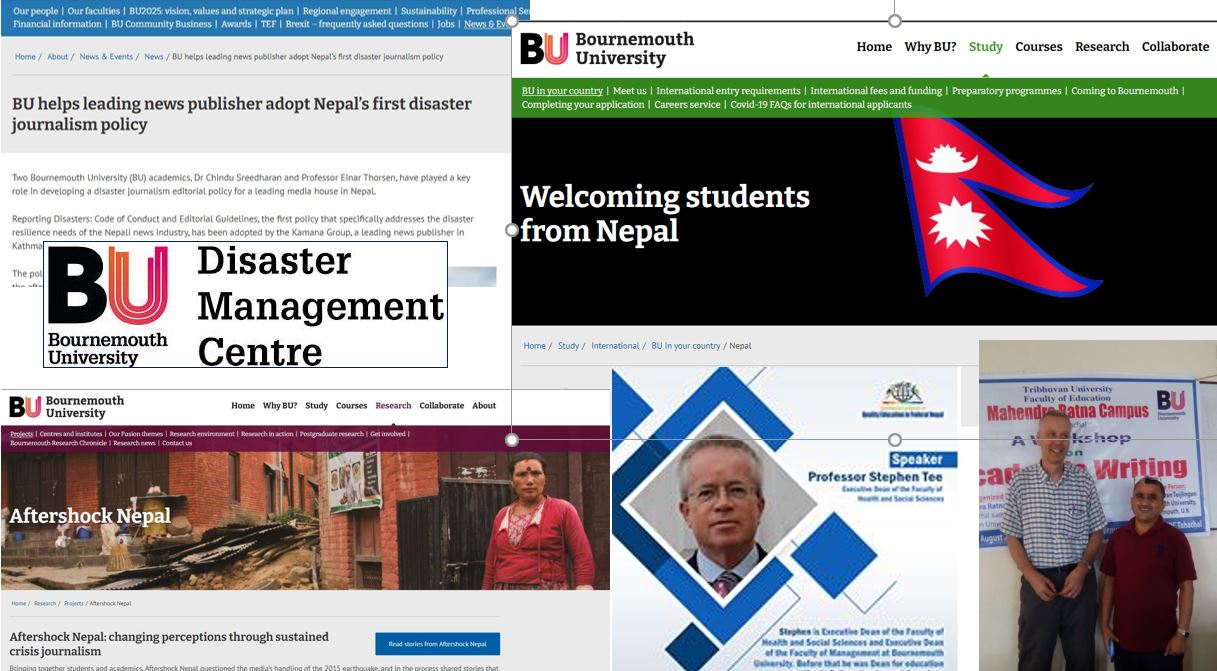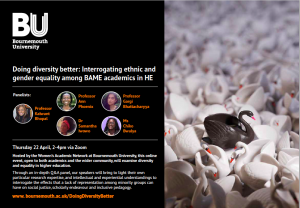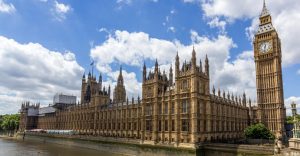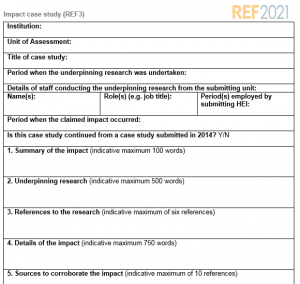Bournemouth University wishes all its Nepali students, staff and collaborators in both the UK and in Nepal a Healthy and Happy New Year 2078 today.


Latest research and knowledge exchange news at Bournemouth University
Bournemouth University wishes all its Nepali students, staff and collaborators in both the UK and in Nepal a Healthy and Happy New Year 2078 today.


First in a series of posts looking at BU’s impact case studies for REF 2021. (The full impact case studies will be published on the REF website summer 2022.)

Research areas: Psychology, Health & Social Care
Staff conducting research: Professor Jan Wiener, Professor Anthea Innes, Dr Sarah Muir, Dr Shanti Shanker, Dr Ramona Grzeschik
Background: BU’s Wayfinding Lab has developed a deep understanding of how ageing, both typical and atypical, affects the cognitive processes involved in spatial recognition. Professor Wiener’s expertise in the design of navigation tasks, environments and experimental levels was used in the design of a mobile gaming app, ensuring it could track age-related changes in navigational abilities.
The impact: The Sea Hero Quest app encouraged users to navigate complex virtual seascapes. In the process, they provided data on their own wayfinding ability and learned how it is affected by typical/atypical ageing. It reached more than 4.3 million users in 194 countries, making it one of the most successful citizen science projects ever conducted. The app established the value of BU laboratory research in the real world; raised awareness of spatial disorientation in atypical ageing and the importance of research in overcoming it; triggered diagnostic innovation; and provided new commercial domains for gaming developers.

Research area: Social Care
Staff conducting research: Professor Lee-Ann Fenge, Professor Keith Brown, Dr Sally Lee, Emily Rosenorn-Lanng, Davide Melacca
Background: BU’s National Centre for Post-Qualifying Social Work is widely regarded as the leader of research into financial scamming and fraud. Beginning with a grant from the Chartered Trading Standards Institute (CTSI) in 2015 to explore the extent of financial scams that target vulnerable individuals, Professors Brown and Fenge and their team then worked with Age UK, the London Borough of Croydon, CTSI’s National Scams team, the Royal Mail, and the Burdett Trust for Nursing, as well as the victims of scamming and their families.
The impact: Based on its research, BU developed key learning resources, which have been distributed nationally, raised awareness of scamming, and increased the protection of vulnerable groups. Nationwide charities, local authorities, the NHS, financial institutions and government all use BU’s research and materials to protect vulnerable people from being defrauded, helping to save consumers from scams worth more than £22 million.
Next post: the media representation of para-athletes & protecting the right to use parody.
 The RDS Funding Development Briefings occur weekly, on a Wednesday at 12 noon.
The RDS Funding Development Briefings occur weekly, on a Wednesday at 12 noon.
Each session covers the latest major funding opportunities, followed by a brief Q&A session. Some sessions also include a spotlight on a particular funding opportunity of strategic importance to BU.
Next Wednesday 21st April, there will be a spotlight on Wellcome Trust’s new funding schemes.
We will cover:
For those unable to attend, the session will be recorded and shared on Brightspace here.
Please email RKEDF@bournemouth.ac.uk to receive the Teams invite for these sessions.
The meeting will be broadcasted LIVE on Facebook

 Focused Symposium – Technology in Physiotherapy Education – Global Perspectives
Focused Symposium – Technology in Physiotherapy Education – Global PerspectivesThe overall aim of the focused symposium was to provide a platform to share practice and discuss the use of technology in physiotherapy education. The abstracts for the symposium had been submitted prior to the pandemic and the transition across the globe to online learning. This meant there was more active engagement in the topic. We agreed there was a need for clearer definitions around online learning as we were all using different terms i.e., virtual classrooms, digital learning, simulated learning etc.
The objectives were:
Many of the discussions were around student engagement, and consideration of what elements of a curriculum can or cannot be delivered virtually. Recognised challenges across the globe were Wi-Fi connectivity, access to laptops and it was clear in some parts of the world physiotherapy programs had experienced significant delays, impacting on the future health care work force. This symposium was carried out with one of our partner organisations Sri Ramachandra HEI, Chennai, India.

“Smart” homes, cities, and motorways, the Internet of Things, and Digital Twins are just some of the 21st century phenomena fast becoming – if not yet a ubiquitous reality on the (Western) ground – at least now common parlance, and no aspect of our lived experience and myriad environments remains untouched by such technologies. As you will be aware, your research – in whatever field you specialise – is not unaffected by these developments. Our Animation, Simulation and Visualisation (ASV) Network literally and virtually plugs into these digital drivers and interfaces, now forming an expanding transdisciplinary group populated by talented, research-active academics from all BU faculties and several research centres, and sharing a commitment to growing high-end, collaborative, fundamental and applied research at BU.
Included in the network are our internationally reputable National Centre for Computer Animation (NCCA) and the Disaster Management Centre (DMC) – both renowned for sterling achievements in their fields – and our more recently launched Institute for the Modelling of Socio-Environmental Transitions (IMSET), and Institute for Medical Imaging and Visualisation (IMIV), who already have a raft of invigorating projects in the pipeline. They are exemplars of the scope and impact of ASV-based or deployed research, and mentioned here to fire up your enthusiasm to explore ASV and ponder how this strategic investment area may be relevant to or harnessed for your research. The strategic mission of the ASV network is to orient the valuable research projects undertaken by BU academics, their partners and stakeholders towards current “real-world” problems which require innovative solutions.
Whether it is entertainment and the pandemic-induced move towards virtual production, the rapidly-evolving digitisation of education, public health or environmental crisis management, the democratisation of medical self-surveillance, state-of-the-art ASV medical diagnostics, AR/VR-enhanced surgical training, virtual access to natural and cultural heritage, inter alia, ASV features in much of the research and practices, products and outputs immanent to these areas of knowledge and expertise. As well as conceptualising, supporting and securing funding for transdisciplinary projects, the ASV network seeks to nurture ECRs and MCRs in their career progression and encourage BU academics to network and explore ambitious, mutually beneficial cross-fertilisations from an ASV perspective which they may not have considered previously.
If you wish to explore how you might become involved in the mission, aims and objectives of the ASV strategic investment area, and ascertain how you might strategically tailor your research for the common good by becoming part of this broad-based, vibrant and dynamic network, please contact me, Nicolette, at nbliebchen@bournemouth.ac.uk, or via MS Teams for an informal chat.
To pique your interest in the strategic investment areas in general, do have a look at the SIA Expression of Interest call for Game-Changing Concepts on the BU Research Blog (on which you shall also find the EoI template: deadline 30 April 2021)
 Wednesday April 21st 16:00 – 17:00
Wednesday April 21st 16:00 – 17:00
The Early Career Researchers Network (ECRN) at BU provides a forum for Early Career Researchers to meet each other, share experiences and learning, and potentially could lead to collaboration on research projects. This year, we are also providing a platform for Early Career Researchers to present their research and/or their experiences. We are launching this with a double bill of presentations at the ECRN meeting on 21st April 16:00 – 17:00.
April’s event features the following :
Improving care and support for people living with dementia with Dr. Michelle Heward, Post Doctoral Research Fellow and member of the Ageing and Dementia Research Centre at BU.
In this talk Michelle will discuss her research journey so far in the field of ageing and dementia. With specific examples of studies that she has been involved in that are designed to improve care and support through hearing the voices, understanding the experiences, and facilitating coproduction of people with dementia, family carers, practitioners, and care staff.
Women’s Sport Governance: Merger-Takeovers in the 1990s and beyond with Dr. Rafaelle Nicholson, Senior Lecturer in Sport and Sustainability.
Raf will be discussing the question why so few women are involved in the governance of sport in the UK, and how can we encourage more women to embrace governance roles, to ensure more diverse decision-making. To try to answer these questions, Raf has been interviewing women who were involved in sports governance in the 1980s and 1990s about their reasons for leaving. She will share some of their stories in this presentation.
These presentations will be followed by Q&A.
If you would like to attend, please contact OD@bournemouth.ac.uk
 The Institute of Medical Imaging & Visualisation (IMIV) has come to fruition thanks to a central University strategic investment and support from the Dorset LEP Growth Fund. A cross University team, and a series of new appointments, have worked tirelessly over the past two years to turn the concept into a reality. Having overcome the challenges presented by the COVID-19 pandemic, the Institute will shortly be opening its doors to progress the strategic priorities of the Institute.
The Institute of Medical Imaging & Visualisation (IMIV) has come to fruition thanks to a central University strategic investment and support from the Dorset LEP Growth Fund. A cross University team, and a series of new appointments, have worked tirelessly over the past two years to turn the concept into a reality. Having overcome the challenges presented by the COVID-19 pandemic, the Institute will shortly be opening its doors to progress the strategic priorities of the Institute.
Some of the first projects that will utilise the MRI scanner at the heart of the institute, stem from the internal pump priming scheme announced in late 2020 and include:
Projects are also planned by Professor Carol Clark exploring the impact of sub-concussion on footballers and a pilot study on the feasibility of using abbreviated MRI for liver cancer screening for at-risk patients, led by Anmol Gangi and Dr Jamie Franklin.
Of course, the possibilities for research relating to advanced imaging are endless. As this article from the Chan Zuckerberg initiative articulates, the past, present and future of medical imaging is a truly fascinating endeavour, with endless possibilities for the future through interdisciplinary collaboration.
To forward future research, the IMIV team welcomes research collaboration ideas and colleagues across BU to access the research facilities housed by the institute. To learn more, read about IMIV on BU’s website or contact the core team directly on: IMIV@bournemouth.ac.uk
The Women’s Academic Network (WAN) at BU are delighted to host this powerful and timely public engagement, open-to-all, Q&A Panel Discussion on one of the most important and urgent issues facing Higher Education (HE) in the UK today.

The Vice Chancellor, Professor John Vinney, will formally open the event which brings together four hugely eminent women academics of-colour, as well as a representative from the Bournemouth University Student Union (SUBU), who are all working within the broad areas of racialisation/ethnicisation and social inequalities. Each panellist will bring their own particular research expertise together with intellectual and experiential understandings to a grounded, candid and in-depth discussion of diversity in contemporary HE.
For more details and registration: https://www.eventbrite.co.uk/e/womens-academic-network-bournemouth-university-doing-diversity-better-tickets-146743055429
The panel context
UK HE is characterised by a homogeneity that fails to reflect social diversity, particularly in terms of ethnicity, gender and social class. These issues need to be located within a complex terrain of interwoven, intersectional experiences. The handy portmanteau term: ‘BAME’ (Black, Asian and Minority Ethnic) can also unhelpfully work to subsume entire groups who are otherwise subject to different levels of discrimination that may thereby remain less visible and therefore neglected. For example, a UCU 2019 report recorded that of a total number of professors in the UK, those self-identifying as ‘Black’ numbered just 85 individuals, and of these a mere 25 were women (Rollock 2019). While recent HESA (2020) data confirms that less than 1% of UK professors self-identify as Black. Unsurprisingly, Mizra (2019, p. 39) refers with horror to the overwhelming ‘hideous’ whiteness of academia. This alarming lack of representation among minority ethnic groups in HE not only exemplifies a dereliction of social justice but is demonstrably counterproductive to the academy across every area of scholarly endeavour, including inclusive pedagogy. The Race Equality Charter under AdvanceHE offers a valuable tool towards remedial action, but without direct debate, will towards and strategies for root-and-branch sector change, such charters are unlikely to create the necessary traction.
Our Panellists:
Professor Kalwant Bhopal is Professor of Education and Social Justice Professor of Education and Social Justice Director of the Centre for Research on Race and Education, University of Birmingham
Professor Ann Phoenix is Professor of Psychosocial Studies, at the Thomas Coram Research Unit, UCL Institute of Education
Dr Samantha Iwowo is the Programme Leader of MA Directing, Film and TV at BU.
Professor Gargi Bhattacharyya is Professor of Sociology at the Centre for Migration, Refugees and Belonging, University of East London
Ms Chiko Bwalya is the Education Vice President of SUBU.
We in WAN look forward to welcoming you.
Colleagues – please share among your networks. Students welcome
The European Research Council (ERC) has announced the tentative opening dates and deadlines for their 2022 calls. They are as follows:
ERC Synergy Grant 2022 Call
ERC Starting Grant 2022 Call
ERC Consolidator Grant 2022 Call
ERC Advanced Grant 2022 Call
There were a few BU academics willing to submit their applications this year but were not able to do it due to time constraints.
These dates are tentative and still subject to change. They differ from the regular yearly cycle that the ERC has established; according to UKRO, the call cycle will revert to the expected times of each year by 2023. The ERC aims to provide as much time and predictability as possible for applicants to prepare while also finding the time for evaluation procedures that last several months for each call.
For more information about the ERC and other Horizon Europe funding opportunities contact RDS Research Facilitator International Ainar Blaudums.
The call for game-changing research concepts is currently open to enable the growth of BU’s Strategic Investment Areas.
This is your opportunity to put forward the concepts for which BU will be known in the years to come. Concepts that are prioritised for development by the SIA Steering Groups, will benefit from tailored institutional support to turn your idea into a reality. This could include identification of match-funding, support from estates, personalised funding development support and much more – you tell us what you need!
Game-changing research concepts are welcomed from all of our academic community across all career stages.
To learn more about the SIAs, the open call and to discuss what you could do, read further details on the staff intranet The Teams links for each of the sesisons are here below for you to save in your calendars. For enquiries, please email sia@bournemouth.ac.uk.
Briefing Events
Briefing events are taking place on the following dates:
If you would like to join the meeting, please save this link in your diary and click on the link to join the meeting on the day: Click here to join the meeting
If you would like to join the meeting, please save this link in your diary and click on the link to join the meeting on the day: Click here to join the meeting
The Breifing events for Animation, Simulation & Visualisation and Medical Science have already taken place but if you have any questions regarding these, please email sia@bournemouth.ac.uk
General drop-in sessions
General drop in-sessions for any queries, to discuss potential ideas or to identify potential BU partners are taking place on the following dates/times supported by SIA Steering Group members and RDS staff:
If you would like to join the meeting, please save this link in your diary and click on the link to join the meeting on the day: Click here to join the meeting
If you would like to join the meeting, please save this link in your diary and click on the link to join the meeting on the day: Click here to join the meeting

Have your say
The Advance HE Postgraduate Research Experience Survey (PRES) is now open
Share your feedback with us by taking part in the Advance HE Postgraduate Research Experience Survey. We are keen to make sure our PGRs have the best possible experience while studying at Bournemouth University. To do this, we need to know what you think works well and what as a University we could do better.
As a thank you for taking part, we will be making a £1 donation for every survey completed to the student mental health wellbeing charity, Student Minds.
How do I take part?
PGRs will receive an email from the University on Monday 12 April 2021 containing a unique link which will allow you to access and complete the survey. If you can’t find this email, contact PRES@bournemouth.ac.uk and we’ll help you to get access.
What will I be asked?
The survey will take around 15 minutes to complete. Your response is confidential and any reporting will be entirely anonymous.The survey is your chance to tell us about your experience as a PGR at BU. It will ask you to share your views on supervision, resources, the research community, progress and assessment, skills and professional development, and wellbeing.
Why should I take part?
Your feedback is important. The Postgraduate Research Experience Survey is the only national survey of PGRs and so is the only way for us to compare how we are doing with other institutions and to make changes that will improve your experience in the future.
More information
If you would like to know more about the survey, please visit: PRES 2021
We hope you take the opportunity to get involved this year and help us make improvements to your experience.
Best wishes,
The Doctoral College
 In this blog post, Dr Fiona Coward explores the profound challenges faced in establishing a transformative research agenda when you lose two seasons of fieldwork, but reminds us of the importance of undertaking activities which are energising and inspiring. On behalf of the IMSET team, she also invites greater collaboration to accelerate our research contribution as we look towards the UN Climate Change Conference (COP26) later this year.
In this blog post, Dr Fiona Coward explores the profound challenges faced in establishing a transformative research agenda when you lose two seasons of fieldwork, but reminds us of the importance of undertaking activities which are energising and inspiring. On behalf of the IMSET team, she also invites greater collaboration to accelerate our research contribution as we look towards the UN Climate Change Conference (COP26) later this year.
“Well, what a time to pick to launch a research institute! Back in early 2020, we were very excited to have recruited four great new colleagues to the brand new Institute for the Modelling of Socio-Environmental Transitions (IMSET) and anticipated great things… Little did we know. A year later, still in lockdown, we’ve learned a few things about doing research in the time of COVID. How do you do research in lockdown? As many have found, doing anything in lockdown can be tricky. The stress of life under lockdown during a global pandemic is enough to deal with on its own, and of course those of us with caring responsibilities have had other pressures. Add that to the extra time consumed by the frantic shift to online learning – the need to record and caption lectures and plan engaging interactive virtual sessions in lieu of face to face seminars, the additional time spent supporting struggling students… For many of us, research had to take a backseat simply because there were only 24 hours in a day and we were exhausted.
There are more practical problems, too: some research simply can’t get done in lockdown. Computer modelling can in theory be done from home… but only if you have the data. Producing new data, however, is … well, tricky. To generate entirely new data on global ecology and human behaviour, there’s no getting around the fact that you need to get out around the globe. It’s impossible to understand past patterns of sea level rise in northern Vietnam without going out there and logging the coordinates of sea notches on the ground; likewise, understanding past environments around the long-drowned continent of Beringia which once connected eastern Russia and north-western America can’t be done without fieldwork to collect samples of ancient plants and animal species. And without access to labs and specialist equipment, it’s impossible to analyse samples and data collected previously. We valiantly battled this one: IMSET’s postdoc was faintly embarrassed to have a new fridge delivered to her house at the start of lockdown, worried she’d be accused of stockpiling food rather than needing space to keep temperature-sensitive samples that could – with difficulty – be studied at home. OK, well fieldwork could wait, yes? Well, no, not really … much of IMSET’s fieldwork is highly seasonal in nature. For fairly obvious reasons, it’s quite difficult to collect ecological samples from Alaska during the northern hemisphere’s winter. Likewise, tramping around Vietnam or Jordan in the heat of summer is definitely best avoided. So when the window of opportunity for one year expires, that’s it until the following year …. We assumed. Only to find ourselves still in lockdown a full year later: two field seasons down. Even with the vaccination programme rolling out relatively swiftly in the UK, travel to other countries will remain difficult; where vaccination rates are slower than the UK, ethically it will not be possible even for vaccinated British people to travel there and work with local teams for extended periods. Similar problems are faced by researchers in any field where data collection is time-sensitive. For those of us lucky enough to be on permanent contracts this is a blow; without data, associated schedules of processing and analysis, writing up, publications, dissemination and other impact activity have to remain on hold., pushed back indefinitely. For those on fixed term contracts – PGRs and post-doctoral researchers – it’s a massive problem. Extensions to funding from UKRI bodies seem unlikely, but future employment and careers hang on presentations, publications, collaborations. It remains unclear how these issues will be accounted for, going forward.
Well, then perhaps we could use the time instead to plan future research projects, develop grant proposals? Well, maybe … The funding landscape changed dramatically during the pandemic, with available funding shunted towards COVID-related research. While to a certain extent that’s understandable, we do also need to keep focus on longer-term challenges – climate change, for example. That’s not going away, global pandemic or no! Grant proposals already under way slowed as we and our collaborators dealt with all the additional demands on our time and thinking; some proposals just couldn’t be progressed because they relied on pilot studies, originally planned for 2020, that had been put on hold; RKE, struggling valiantly with a raft of short-term COVID related projects with extremely short lead times, understandably had less time for support; uncertainties over HE funding in the short and medium term prompted more careful scrutiny of prospective bids, and put the kibosh on some which had been years in development.
Grants already submitted now look out of date as they failed to foresee the coming global pandemic; ones being submitted now need careful consideration of the ways in which they can be adapted or modified in the event of ongoing global or local lockdowns and COVID mitigation measures. Reviewing and decisions about outcomes either way is also taking longer, as everyone deals with the same problems. The funding landscape of the future remains unclear, but post-Brexit and in the wake (hopefully!) of the pandemic ongoing economic concerns forcing difficult decisions (witness the recent withdrawal of the ODA money from already allocated projects!), we can expect big changes.
The past year has been a difficult one for many. Time for research was squeezed or simply vanished as we tried to get our heads around phonics (yes – teachers are saints); remain sane as we watched the death count grow on a daily basis; worry about our loved ones and wonder when we might get to see them again. And yet research remains important, even – dare I say it – fun. Energising. One thing I have learned is that just as the best response to feeling run down and exhausted is – counterintuitively – to do some exercise, the best response to despair in the face of the impossibility – surely? – of research, is to dive back in. Finding it difficult to think deeply about anything right now? Time-limited? (I know I’m both!) One answer might be to create short stints of time in the madness to just chat about your research interests. Maybe it will, ultimately, lead to a formal project, or collaboration, or grant proposal …. And maybe it won’t, but perhaps that’s OK. It will kickstart your grey matter and – dare I say it – give you a chance to think about something other than the day-to-day grind of life in a pandemic, to chat with friendly colleagues facing the same problems, and to explore research and fusion-related questions, issues and themes without any pressure. OK, so research in the time of COVID is difficult – but it’s difficult for everyone. It’s not just you, promise. So let’s work together to improve things. Remember when research was fun, not just another chore you had to squeeze into your overstuffed day? Let’s bring a little of that fun back again.
Part of that joy – and growth from the adversity we encountered – comes in seeking out new collaborations and, with it, directions for future research, impact and engagement. Not least as the UK looks towards hosting COP26 and considering the impact of climate change once again. With that in mind, we would like to invite colleagues across BU and beyond to work with us. IMSET has a series of events in the pipeline which all are welcome to attend, and if you can’t make them then just drop us a line and we can catch up with a virtual coffee and chat. We’re interested in all things sustainability, from systems modelling to working with local communities across the globe to understand how people interact with their environments and to develop resilience and sustainability at the grass roots. If you work in any area relating to sustainability, human/environment relations, community engagement or beyond, drop us a line! Contact the core team, or email IMSET@bournemouth.ac.uk.
The past year has taught a lot – one thing it’s made abundantly clear is the power and importance of research. Not all of us can directly work on preventing the next global pandemic, but COVID has also sparked a lively debate about the impact of human interactions with other animals and with the environment more generally; probably many of us can contribute in some way to this wider picture, so if you’re interested, get in touch and let’s help each other get through!
Free training sessions for BU staff on engaging the public in your research, as part of the RKEDF.
This course will cover why evaluation is important, look at ways to get started, explore different techniques, and consider what your findings can tell you and your organisation or funder. We will also cover the ways in which evaluation can be used to generate evidence for impact. With an emphasis on how to conduct evaluation, join us for a programme of practical activities and discussion as together we demystify evaluation and find the fun in revealing and identifying your effectiveness. This workshop will be delivered by expert trainers from the National Co-ordinating Centre for Public Engagement (NCCPE).
This course will develop your public engagement skills to a high level. It is aimed at academics with some public engagement experience, and/or those who have completed the ‘Getting started in Public Engagement’ session. The course offers an opportunity to reflect on past public engagement work and plans for the future. In particular, we will focus on developing your own plans with guided feedback and discussion. This workshop will be delivered by expert trainers from the National Co-ordinating Centre for Public Engagement (NCCPE).
UK Parliament’s Knowledge Exchange Unit has two free online training sessions coming up in May. The sessions are popular and fill up quickly, so book your free ticket as soon as possible! You can also access recordings and resources from previous ‘Parliament for Researchers’ training sessions, including sessions tailored for researchers at different career stages and covering different topics such as select committees and writing for a parliamentary audience.

Parliament and Government are separate institutions, with different ways for researchers to engage with each. To complement your knowledge about working with Parliament, join this practical online training session to explore how research evidence and expertise is used by Government and how you as a researcher can engage, plus how this relates to research use at UK Parliament. Featuring speakers from across UK Government.
Join this practical online training session to explore research use by the UK’s devolved legislatures and how you as a researcher can engage, plus how this relates to research use at the UK Parliament. Featuring speakers from the Scottish Parliament, Northern Ireland Assembly and Welsh Parliament/Senedd Cymru.
For more information about online training for researchers from UK Parliament, email Parliament’s Knowledge Exchange Unit on keu@parliament.uk.
 I invite you to join us in developing our proposal for Sustainable Storytelling for Science & Health as a game-changing concept supporting BU SIAs. In brief, we propose to explore and evaluate science and health communication through popular narrative across a variety of media and genres. How do popular narratives educate and influence behaviour, as well as entertaining us? How can we use these works to effect behaviour change in areas relevant to global challenges (such as the UN Sustainable Development Goals)?
I invite you to join us in developing our proposal for Sustainable Storytelling for Science & Health as a game-changing concept supporting BU SIAs. In brief, we propose to explore and evaluate science and health communication through popular narrative across a variety of media and genres. How do popular narratives educate and influence behaviour, as well as entertaining us? How can we use these works to effect behaviour change in areas relevant to global challenges (such as the UN Sustainable Development Goals)?
What do we mean by “science and health”? We’re taking a broad approach, so we want to be open to communication of all research conducted at BU, which includes humanities and social science as well! Current and proposed projects encompass sustainability, ecology, archaeology, heritage, public health, medical information, training, mental health and suicide, social care, media literacy, assistive tech, dementia, and more.
What do we mean by “popular narrative”? Play and narrative are fundamental learning techniques stretching back before written culture and formal education, and the public learns a great deal from the media they consume. Science communication scholars have been advocating for entertainment media producers to include authentic science in their work, so we think the converse carries merit: entertainment media with accurate and persuasive educational content can have positive benefits on audiences. Thus, we intend to explore science and health communication through prose, journalism, games, film, documentary, television, VR/AR, immersive experiences, interactive narratives, comics/graphics, performance, social media, and more.
Who are “we”? Aside from the royal we of me, we are a (growing!) team of researchers in communications, journalism, narrative, public health, health, ecology, behaviour, marketing, animation, digital humanities, performance, film, media, nursing, and more. I am leading the bid from my cross-faculty position in Health & Science Communication and the emerging Science, Health, and Data Communications Research Group, and I welcome co-investigators as well as team members.
Bournemouth University already has a plethora of experts and a strong foundation of projects in these areas across multiple faculties; this proposal would enable us to come together in a more formal manner to amplify our current work and foster new research collaborations. If you want to be involved but you’re not sure how your work/interests fit in, please feel free to contact me. If you’re sure you want to be involved, also contact me!
Engaging with new collaborators can be an interesting challenge. As with many relationships, the foundations of collaborations will be built upon common interest and trust. Following many cliches, this is something that can take time to grow or demonstrate.
With the ever-changing world of research funding some organisations may not be eligible for funding based on geography, financial status or organisation type. Broadly speaking, collaborators will be expected to provide some form of contribution (e.g. match funding) for participating in research projects. For these reasons, some helpful reminders are provided below for adding stakeholders to research and knowledge exchange (RKE) activities.
1) Find common ground.
If you plan on contacting a stakeholder, ensure they are appropriate to join the project, and that the work would fit within their priorities. A common mistake is to contact a ‘big’ company, or multi-national organisation, without first identifying how the intended collaboration will fit within their priorities.
2) Get out there.
At times, serendipity can contribute to the forming of research collaborations. Publish to get your work known, attend open stakeholder events (e.g. KTN), and advertise your expertise and willingness to join collaborations (e.g. Konfer).
3) Haste makes waste.
Contacting a potential collaborator near a deadline, to apply pressure to join a consortium, may give the wrong impression. Given that many schemes require a form of match funding, ‘cold calling’ and essentially asking for money to join something that is of interest to you, may close more doors than are opened. Reach out, and if there is common interest (as number 1 above), establish ways to communicate further and perhaps arrange for future ways of collaboration. It may seem obvious but a common mistake is to be too informal, and too quick in writing a potential collaborator. Always start off formally in any correspondences and then judge from there.
4) Phone a friend.
You may already have a larger network than you realise. As well as contacts within your department, make use of colleagues throughout BU. If you contact RDS, you can be signposted to someone who can help you and who may already know the correct person to contact with established relationships. For some organisations, that receive hundreds of requests to collaborate every year, there may be agreements in place between BU and the stakeholder, so a named person will act as the conduit of communication in the first instance. If in doubt, ask BU colleagues.
5) Prepare a pitch.
Put what you wish to accomplish into writing. Ensure you put down what the future opportunities may be in joining a collaboration, put down your unique suitability to collaborate, and be sure to articulate the benefits of joining a collaboration. In short, this can be a quick pitch to collaborate, all in a short document. If you’ve sent this to the wrong person in an organisation, this can easily be shared.
Collaborating with industry: why it matters
These collaborations are important not only on a personal level to enhance your knowledge exchange profile, as a natural progression from your research – research in action, if you will – but also for BU and wider society.
Collaborations with external partners is a great way to demonstrate impact. This could be wide ranging from projects such as collaborative funding, to things like CPD and consultancy. A thing to remember is, that if somebody has paid for knowledge exchange, through direct funding or co-funding on an application, the odds are that they will use the work. This may be unlike any purely academic work that may never see the light of day beyond a journal paper.
On a personal level, you will develop a KE track record in working with industry that can help to bring your teaching to life and give further direction on your future research.
On an institutional level, all collaborations with external sources are tracked and contribute to BU’s annual returns. To explain further:
The Higher Education Business & Community Interaction (HE-BCI) survey requires us to document all of our interactions with external sources, as the survey name suggests. As a result of this annual return, there is a mystical algorithm that uses this data and some other sources, to calculate our annual HEIF allocation. So, by BU maximising opportunities in working with external sources and documenting this work, we have a stronger return and thus could expect more HEIF funds to use across BU to strengthen our Knowledge Exchange provision – this could mean more HEIF project money is available!
The Knowledge Exchange Framework (KEF) is a relatively new addition to the Framework stool (with the Research Excellence and Teaching Excellence Frameworks being the other two legs). This Framework is set to be a regular return for institutions to complete as an aid to assess our own performance and provide continuous performance opportunities. The results of these returns are published to provide accessibility of world-leading research to external collaborators.
In short, by working with external collaborators, there are benefits to yourself on an individual level, benefits to BU and arguably more importantly, wider societal and/or economic benefits.

Behind the headline figure of 47 impact case studies BU submitted to REF 2021 is several years’ preparation: a ‘light touch’ exercise in 2015, a stocktake in 2017-18, an impact review in 2018, two full Mock Exercises in 2019 and 2020, and a further adhoc review last November. The number of case studies submitted to the 2020 Mock was actually 73 – illustrating the fact that an even larger pool of researchers was involved in the process of honing BU’s impact submission.
Inevitably, impact case study teams heaved a huge sigh of relief once the button was pushed on REF 2021, but impact exists beyond REF, and, of course, existed before it. As Fast Track Impact’s Mark Reed puts it, ‘impact is the good that researchers can do in the world’. With that in mind, we will be showcasing BU’s impact case studies on the Research blog over the coming weeks. As well as acknowledging the hard work that went into producing them, and highlighting the breadth of BU’s research, we hope this series of posts will also provide insight and inspiration for researchers at all stages of their careers.
 A 5-page document, comprising:
A 5-page document, comprising:
… and all conveyed in a style as accessible to the lay reader, as to the expert in the field.
Next post: 1) how BU research informed one of the largest citizen science projects ever conducted; and 2) helped save consumers from more than £22m in scams.